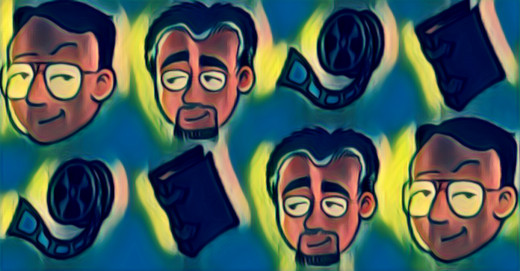Ken and Robin Consume Media: Come For the Tacos, Stay for the Criminal Profiling
September 24th, 2019 | Robin

Ken and Robin Consume Media is brought to you by the discriminating and good-looking backers of the Ken and Robin Talk About Stuff Patreon. Each week we provide capsule reviews of the books, movies, TV seasons and more we cram into our hyper-analytical sensoriums. Join the Patreon to help pick the items we’ll talk about in greater depth on a little podcast segment we like to call Tell Me More.
Recommended
Boom Town (Nonfiction, Sam Anderson, 2018) Subtitled “The Fantastical Saga of Oklahoma City, Its Chaotic Founding, Its Apocalyptic Weather, Its Purloined Basketball Team, and the Dream of Becoming a World-class Metropolis,” Anderson’s book tells the story of my quondam hometown through the lens of its NBA team and its meteorologist hero Gary England, with sidelights into its disastrous I.M. Pei-designed “urban renewal,” the Oklahoma Land Run, the Murrah building bombing, and OKC’s memory-holed role in the civil rights era. In this stress test of the principle “there are no dull topics, only dull authors,” Anderson triumphs, striking gushers of weirdness and truth in a place allergic to both. –KH
The Chase (Film, US, Arthur Ripley, 1946) Down-on-his-luck veteran (Robert Cummings), chauffeur to a brutal criminal (Steve Cochrane), rescues his wife (Michele Morgan) from his controlling clutches. This haunted, dreamlike noir B-movie has it all: weird atmosphere, an odd automativd gimmick, sudden love, gay subtext, Peter Lorre, reality shifts, and a recursive structure that loops back on itself.—RDL
Death From a Top Hat (Fiction, Clayton Rawson, 1938) Two murders of two magicians (well, an occultist and a magician) in two locked rooms, both bodies strangled in a pentacle for the demon Surgat, who opens all locks. This being a Golden Age mystery, not a fantasy novel, the Great Merlini solves the case using his knowledge of stage magic (and magicians) and the requisite annoying showmanship. For a first novel, the plot and puzzle work amazingly well, and despite literal pages of exposition at some points, it never drags. –KH
Mindhunter Season 2 (Television, US, Netflix, Joshua Donen & Courtenay Miles & David Fincher, 2019) Now working under an enthusiastic boss, Ford (Jonathan Groff) and Tench (Holt McCallany) interview Berkowitz and Manson, then butt up against local political hurdles when assigned to the ongoing Atlanta Child Murders. A subtle protagonist switch puts the more likeable Tench in the viewpoint role as Fincher’s chilly crime world gives way to director Carl Franklin’s acute portrait of a steamy, stymied Atlanta. The killer roles are always a meal for this show’s guest actors; here Christopher Livingston brilliantly captures Wayne Williams as an impertinent goober.—RDL
The Praise Singer (Fiction, Mary Renault, 1978) While not as thunderous as her Alexander trilogy or as glorious as her Theseus books, this brief novel — told as a reminiscence by the 6th-century BC lyric poet Simonides of Keos — still grabs the reader with its natural, albeit un-lyrical, voice and engaging eye for character. A kind of backstage-showbiz novel less about art than patronage, it also provides plenty of interesting historical filips that leave you wanting more, a maxim Simonides would surely have endorsed. –KH
Taco Chronicles (Television, Mexico, Carlos Perez Osorio, Netflix, 2019) Documentary series examines the origins, production methods, and enthusiastic clientele of six classic taco varieties, from the shawarma-derived pastor to the portable, fat-drenched canasta, or basket taco.. Edifying and mouth-watering, if you can get past the whimsy of having each episode narrated in the voice of a particular taco.—RDL
Good
The Footprints on the Ceiling (Fiction, Clayton Rawson, 1939) Stage magician and amateur sleuth the Great Merlini visits Skelton Island (in the East River) to expose a phony medium and discovers a phony suicide complete with footprints on the ceiling. Rawson throws even more stuff into his second novel, from pirates to blue men, but in fine misdirection style it mostly distracts from the business at hand, and not entirely to the book’s benefit. Still, the strong setting of this installment and the fun meta qualities of this series remain engaging. –KH
Glow Season 3 (Television, US, Netflix, Liz Flahive & Carly Mensch, 2019) The wrestlers find an audience with their show in Vegas, leaving them to wonder what they really wanted in the first place. The ennui that follows success provides a fresh theme for the series, though in practice this means splitting the ensemble into individual soapy plotlines, without sufficient run time to develop them.—RDL
Mindhunter Season 2 (Television, US, Netflix, Joshua Donen & Courtenay Miles & David Fincher, 2019) The problems of success begin to rear their heads as the nascent Behavioral Sciences Unit weathers new pressure to look good first and do good second. The choice of director Carl Franklin, and the Atlanta child killings, for the core of the season hit pay dirt narratively. It’s a shame that pointless, padded subplots about two agents’ personal lives wrap around and muffle that core. Holt McCallany remains the key performer of the series, even as the show vigorously embraces its “serial killer interview as actor’s workshop” leitmotif. –KH
Twilight (Film, US, Catherine Hardwicke, 2008) When teenager Bella Swan (Kristen Stewart) moves to cloudy Forks, Washington she attracts the romantic attentions of local vampire Edward Cullen (Robert Pattinson), endangering the supernatural balance of power. Hardwicke’s explicit fairy-tale direction and compassion for the characters create probably the best film that could faithfully adapt the mawkishly adolescent source novel. The vampire baseball scene, insane as it is, remains an example of cinema’s full potential to show something no other medium can. –KH
Okay
The Editor (Film, Adam Brooks & Matthew Kennedy, Canada, 2014) Film editor (Brooks) with a dissatisfied wife (Paz de la Huerta) becomes the chief suspect in a series of brutal murders at his film studio, as investigated by a randy police inspector (Kennedy.) Giallo spoof minutely pastiches the genre, including not only egregious pseudo-dubbing and a shambolic plot, but also paper-thin characterization, which wears poorly at feature length.—RDL















I first read “The Praise Singer” 25 years ago when I was on a kibbutz in Israel and was looking for anything in English to read. I loved it and it is still my favorite book by Mary Renault.
Never thought I’d want to read a book about OKC history before today. But Ken rarely steers me wrong 🙂